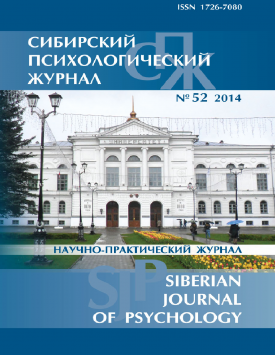Features of emotional attitude to religious cultures among modern youth (cross-cultural studies)
The article presents the results of empirical studies of the emotional relationship to the religious culture of today's youth. Method of research: focus group discussion and personal interview. The study was conducted in three target groups: representatives of modern youth identifying themselves as the bearers of the religious culture of Orthodox Christianity, Islam, atheists. The study revealed the existence of culture-specific features of emotional relationship to the religious culture. Emotional attitude to the religious culture of young people positioning themselves as Orthodox Christians, is characterized by distant and indifferent, with deep emotional acceptance of religious culture and the lack of emotional connection with it. At the heart of this emotional relationship the nominative religiosity of these young people (they often do not consider it necessary to fulfill their religious life in social practice) is likely presented. Emotional attitude of Muslims towards religious culture is characterized by versatility, positive and bright emotional displays. In the study respondents demonstrated a deep involvement in the world of religious culture that engenders in them a rich range of emotions regarding this sociocultural system. Emotional attitude to the religious culture of young people who call themselves atheists, characterized by negativity and rejection, feelings of contradictions and demonstrative neglect, which can be explained by the characteristics of their connection with the religious culture (past religious experience) and youthful nihilism and eclecticism of their worldview . They are not so much atheists as they want them to appear. They are more of a social group refused or ceded (temporarily or permanently) from religion. The study revealed the existence of a stable connection between the emotional attitude of the individual to the religious culture and its level of awareness of the social and cultural reality. Greater awareness of the content of religious culture creates the conditions for a positive emotional relationship. Better knowledge of religious culture, with which a person identifies himself, promotes greater emotional acceptance. The study revealed the relationship between emotional attitude to the religious culture of personality with which it identifies itself and religious cultures that are perceived as alienate. The deeper is emotional connection with "own" religious culture the greater is the likelihood of emotional acceptance and understanding "alienate" religious culture. Lack of emotional connection with their "own" culture deprives sociocultural identity and ideological core, prevents adequate understanding of cultures, promotes the formation of contradictory and inconsistent relationships to both their own and other people's religious cultures.
Keywords
эмоциональное отношение, религиозная культура, православные христиане, мусульмане, атеисты, emotional attitude, religious culture, Orthodox Christians, Muslims, atheistsAuthors
| Name | Organization | |
| Malyavina Svetlana S. | Branch of the Russian Presidential Academy of National Economy and Public Administration (Volgograd) | s.malyavina@yandex.ru |
References

Features of emotional attitude to religious cultures among modern youth (cross-cultural studies) | Sibirskiy Psikhologicheskiy Zhurnal – Siberian Journal of Psychology. 2014. № 52.
